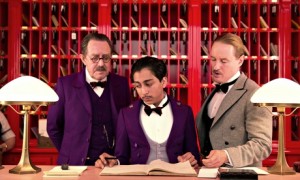
Be Sure to Visit The Grand Budapest Hotel
Those familiar with Wes Anderson films recognize his trademarks: clever writing, ensemble casts, a particular eye for detail, and his love of nostalgia and outdated quirks. The combination of his stylistic elements always results in a film that is distinctly his own. When he is at his best, Anderson delivers greatness, notably Rushmore (1998) and The Royal Tenenbaums (2001), but when he is not, it can be frustrating, like Darjeeling Limited (2007). In 2013, Moonrise Kingdom reminded audiences of how talented Anderson can be and in The Grand Budapest Hotel, Anderson surpasses that mark once again.
The film opens with the author of a book (played by Tom Wilkinson, Felony, 2013) not surprisingly named The Grand Budapest Hotel, narrating how not all great stories come from the imagination, they can be amazing coincidences. It then cuts to a flashback to when the author was a young man (Jude Law, Side Effects, 2013) visiting the film’s namesake, The Grand Budapest Hotel, and heard the tale that forms the events of the movie firsthand from the hotel’s elderly proprietor, Zero Mustafa (F. Murrary Abraham, Homeland, 2013). The dual narrators and double flashbacks seemed unnecessary, but once Zero begins the main tale about how he originally obtained the hotel, the film really excels.
The story begins at the hotel with a young Zero as a new lobby boy under the hotel’s charming and capable concierge, Monsieur Gustave H. (Ralph Fiennes, The Invisible Woman, 2013). Zero intricately describes how Gustave perfectly manages every detail of the enormous hotel while charming his guests and even romancing the older widows. Tilda Swinton (The Zero Theorem, 2013) in an excellent make-up job, plays one such widow who has had a 19-year relationship with Gustave and as she leaves for the end of the season pleads with her beloved concierge to run away from his post and come with her as she fears she’s dying. Although he believes the news to be a bit dramatic and does calm her fears, he surprisingly receives notice that she has passed away. Always the consummate gentleman and devoted servant to his clients, Gustave goes to her house to pay respect only to find a slew of extended family members there waiting to find out who will receive her enormous estate. When Gustave is named the recipient of a priceless painting, her selfish and nefarious children are up in arms and accuse him of being a con artist and thief. The battle between her oldest son (Adrien Brody, The Pianist, 2002) and his violent henchman J.G. Jopling, (Willem Dafoe, Out of The Furnace, 2013 ) against Monsieur Gustave who is aided by the young Zero drives the crux of the plot.
Fiennes who has had his most notable roles arguably as a villain in Schindler’s List (1993) and the Harry Potter franchise, is fantastic as the protagonist. Although Anderson is known for working with the same actors repeatedly, as a newcomer, he steals the film. Still, the secondary characters do a wonderful job with Anderson’s hilarious dialogue and absurd scenarios including Jeff Goldblum, Harvey Kietel, Edward Norton, Owen Wilson, and of course no Anderson movie could be complete without an appearance by Bill Murray. Although Anderson’s style is not for everyone, this film’s cast and plot is worth checking out and represents possibly his broadest comedy yet.
Bottom-Line? Clever dialogue, fantastic sets, and a strong ensemble cast provide an entertaining movie-going experience.
Cast: Ralph Fiennes (Monsieur Gustave H), Tony Revolori (Young Zero Moustafa), Adrien Brody (Dmitri Desgoffe und Taxis), Willem Dafoe (J.G. Jopling), Jeff Goldblum (Deputy Vilmos Kovacs), Saoirse Ronan (Agatha), Edward Norton (Inspector Henckels), F. Murrary Abragam (Old Zero Moustafa), Mathieu Amalric (Serge X), Jude Law (The Author as Young Man), Tom Wilkinson (The Author as Old Man)
Credits: Directed and written by Wes Anderson
Studio: Fox Searchlight
Run Time: 99 minutes
Jessica Aymond © March 30, 2014
